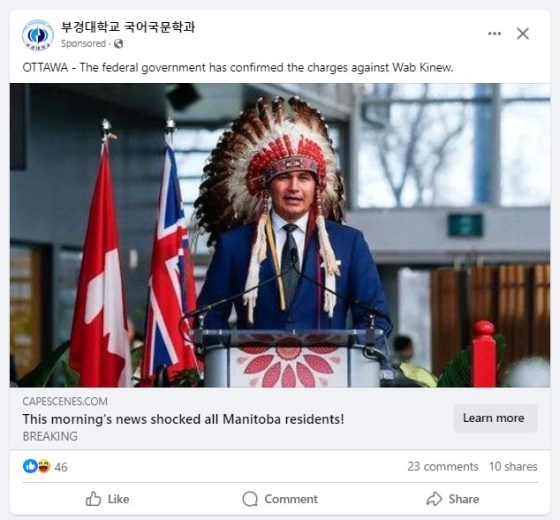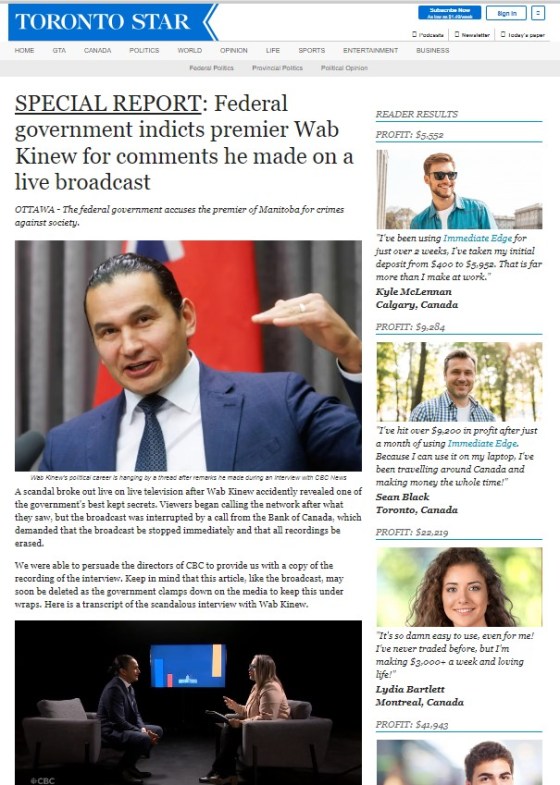|
A few short weeks ago, this evening note to you mused about artificial intelligence’s power to speed lies ‘round the world while putting the boots to truthful pursuits.
In a decidedly dystopian take, I raised the spectre of a not-too-distant future of weaponized fake news farms, driven by AI, that could overwhelm the ability of a newspaper like the Free Press to catch up with the truth.
The basis of my jeremiad was a newsroom exercise we conducted that had ChatGPT crank out seemingly authentic damning news stories on Premier Wab Kinew, devoid of any facts.
Advertisement
 Why this ad? Why this ad?
A few short weeks later, that dystopia is already here.
In a series of Facebook ads our newsroom stumbled across, readers were taken to fake news stories about Kinew disguised as legitimate articles “posted” on the website of the Toronto Star and citing CBC News.
Here’s the Facebook ad:

An advertisement on Facebook promotes a fake news story about Manitoba Premier Wab Kinew. Note it’s already been shared 10 times. (Screenshot)
When site users click on the ad, they’re taken to a page with a “SPECIAL REPORT.”
“Federal government indicts premier Wab Kinew for comments he made on live broadcast,” blares the headline atop the website that looks and feels like that of the Toronto Star.
The supposed news story looks to rachet up its authenticity factor by then linking to a CBC interview of Kinew by Marcy Markusa, the host of the public broadcaster’s morning show, Information Radio.
You see pictures of Markusa facing off with Kinew along with a “transcript” of that interview, filled with more lies, untruths and fakery.

The Facebook ad points to a fake news story on a website that falsely identifies itself as the Toronto Star. (Screenshot)
If you take the time to scroll all the way down the page, you might detect that something seems not quite right.
Maybe it’s the reference to an improbable call from the Bank of Canada demanding that the broadcast of the interview be stopped. Perhaps it’s the NDP premier badmouthing Prime Minister Justin Trudeau because of what he derides as a socialist government. You might cast a skeptical eye at the ads adjacent to the story, hawking the investment program Kinew was apparently promoting for cash-strapped Canadians.
But here’s the thing: In a world where our consumption patterns involve incessant swiping rather than scrolling all the way to the bottom, a damning headline is often all that we see — all that sticks with us.
The damage is done long before the Free Press or any other trusted media outlet can engage.
But let’s pretend for a moment that the Free Press did try to catch up to that lie and set the record straight with a story that explained this one was a lie. Meta’s blocking of news on its Facebook and Instagram platforms would prevent Canadians from sharing the legitimate news story — one that debunks the false story Meta had no problem spreading.
Dystopia, meet reality.
In an interview in the Globe & Mail this week, Nobel laureate Maria Ressa warned of the possibility of journalism dying in the age of AI as the internet deteriorates in a way that leads people to tune out when they distrust everything.
“I’ve said this so many times, without facts you can’t have truth, without truth you can’t have trust, and without trust you can’t have democracy,” she said.
Unlike the supposed CBC interview with Kinew, Reesa’s Q&A is real – and really terrifying.
|

